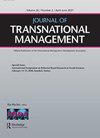An integrated model of the effects of service evaluation, corporate image, and switching barriers on customer loyalty
引用次数: 12
Abstract
ABSTRACT The purpose of this study was to examine the relationships between service evaluation, corporate image, switching barriers, and customers’ intentional loyalty. The proposed model was tested and valuated in the mobile services context. A field survey was conducted using a structured questionnaire about the investigated concepts. To test the proposed hypotheses, a model was constructed and estimated using the method of partial least squares. Findings indicate that service evaluation constructs have both direct and indirect effects, through customer satisfaction and corporate image, on customers’ intentional loyalty. The outcomes suggest that marketers, in their effort to develop more customer-oriented marketing plans, should consider both the pool-in factors, reflecting the value of the provided services, customer satisfaction, and corporate image, and the interactions among them, as well as the push-back factors, as they all impact on customers’ behavioral intentions. The research was limited to one service setting and the proposed model should be cross-validated in other service settings before the relationships among its components are fully clarified. Also, the use of cross-section design reduces inference ability regarding temporal changes in research constructs. This article contributes in adding to the body of the existing knowledge by considering both corporate image and switching barriers, along with service evaluation constructs, as antecedents of consumer’s intentions determination, resulting in a model that has not been investigated thus far.服务评价、企业形象和转换壁垒对客户忠诚度影响的综合模型
摘要本研究旨在探讨服务评价、企业形象、转换障碍与顾客意向忠诚之间的关系。在移动服务环境中对所提出的模型进行了测试和评估。采用结构化问卷对所调查的概念进行了实地调查。为了验证所提出的假设,我们构建了一个模型,并使用偏最小二乘法进行了估计。研究结果表明,服务评价结构通过顾客满意和企业形象对顾客有意忠诚有直接和间接的影响。结果表明,营销人员在制定更多以客户为导向的营销计划时,应考虑反映所提供服务的价值、客户满意度和企业形象的汇集因素及其相互作用,以及推回因素,因为它们都影响客户的行为意图。该研究仅限于一种服务设置,在其组成部分之间的关系得到充分澄清之前,所提出的模型应在其他服务设置中进行交叉验证。此外,横截面设计的使用降低了对研究结构中时间变化的推断能力。本文通过考虑企业形象和转换障碍,以及服务评估结构,作为消费者意图确定的先决条件,为现有知识的主体做出了贡献,从而得出了一个迄今为止尚未研究的模型。
本文章由计算机程序翻译,如有差异,请以英文原文为准。
求助全文
约1分钟内获得全文
求助全文
来源期刊

Journal of Transnational Management
Social Sciences-Development
CiteScore
2.30
自引率
0.00%
发文量
10
期刊介绍:
As the economic marketplace expands across continents and cultures, it is essential to establish a world-wide network of ideas and information that serves your transnational business interests. The Journal of Transnational Management (retitled from the Journal of Transnational Management Development to better reflect its focus) is an international forum that examines management research, teaching and training techniques, consulting, and development issues from a multicultural perspective, presenting practical business strategies that produce results on a global scale. The Journal of Transnational Management is a comprehensive resource for management in foreign environments, presenting an exchange of conceptual and empirical research on an international level. Articles written by business practitioners, management development experts, and academicians address issues related to firms, public enterprises, educational institutions, and nonprofit organizations throughout the world.
 求助内容:
求助内容: 应助结果提醒方式:
应助结果提醒方式:


